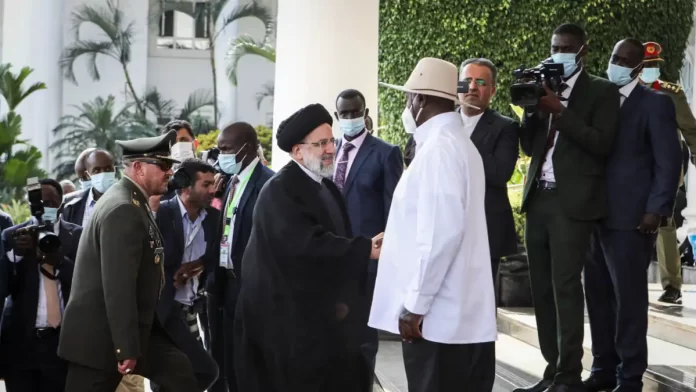Uganda seeks Iranian assistance in developing its energy sector, including oil and nuclear, through technology transfer and project funding.
President Museveni invites Iranian President Raisi to invest in Uganda’s $4.5 billion refinery project to address funding shortages.
Uganda seeks Iranian assistance in developing its energy sector, including oil and nuclear, through technology transfer and project funding.
Uganda and Iran explore collaboration in the oil industry and nuclear energy development to meet Uganda’s energy demands and counter Western opposition.
Uganda is looking to Iran for assistance in developing its energy sector, particularly its oil and nuclear sectors, through technology transfer or project funding.
Faced with a shortage of funds for the $4.5 billion refinery project in the oil-rich Albertine area, the president of Uganda, Yoweri Museveni invited his Iranian colleague Ebrahim Raisi to explore investing in the project.
Read more: 289 teenagers died crossing Mediterranean Sea in 6 months: UNICEF
On Wednesday, during President Raisi’s first trip to Africa in 11 years, which also included stops in Kenya and Zimbabwe, the Iranian leader spoke with his host, Mr. Museveni, in State House Entebbe.
Iran has a wealth of expertise in developing oil refineries and has made tremendous advancements in the petrochemical industry, the Ugandan president observed. He requested that the guest show the technique to Ugandan researchers.
In response, President Raisi said Tehran was prepared to collaborate and share resources with Uganda, a nation he described as friendly, to advance its oil industry. “When it comes to energy in general and oil in particular, Iran enjoys expansive experience there and we are ready to share this experience with Uganda,” the Iranian president noted.
Uganda’s oil industry has come under fire from the West and rights organizations, who are putting pressure on international lenders to refuse funding for its crude pipeline and refinery due to worries about the environment and human rights.
In order to complement Uganda’s energy demands as it rushes toward industrialization, the two nations are also in discussions to exchange expertise on nuclear energy development with Iran, one of the potential locations for the country’s first nuclear facility. Both Museveni and Raisi criticized the West during their speeches for what they referred to as neo-colonialism and purposeful measures to impede the growth of third-world nations.
According to Raisi, who praised Uganda for its anti-homosexuality position, Western nations often do not want other resource-rich nations to be fully autonomous and instead front human rights violations to punish them. “They do not want to see you adding value to your resources and want you to only export raw materials which they themselves process and sell back to you at higher prices,” he said.
Uganda intends to produce 40,000 megawatts of power as part of its Vision 2040 growth strategy in order to reach its objectives. Officials from the Ministry of Energy said that Kampala sees Tehran as a crucial partner in the creation of a 2,000 MW nuclear power capability. Russia, China, and the US are additional nations Uganda collaborates with on nuclear energy development.













